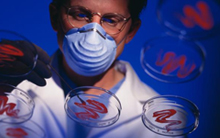Virologist as a Career
 A virologist is a professional in the area of Microbiology. Virology is the study of the structure and function of viruses and of the diseases caused by virus infections. Viruses are pathogens. Virologist studies these processes at the molecular level. The career is of virologist is very challenging and professional must have thorough knowledge of study material. Some virologists study the composition and function of newly discovered antiviral compounds. Virologist mainly works in the laboratory. They have to develop skill for accuracy and must give attention to detail. To become virologists, a background in biology is required and they are trained in this field to execute research. Candidate must have biology in high school.
A virologist is a professional in the area of Microbiology. Virology is the study of the structure and function of viruses and of the diseases caused by virus infections. Viruses are pathogens. Virologist studies these processes at the molecular level. The career is of virologist is very challenging and professional must have thorough knowledge of study material. Some virologists study the composition and function of newly discovered antiviral compounds. Virologist mainly works in the laboratory. They have to develop skill for accuracy and must give attention to detail. To become virologists, a background in biology is required and they are trained in this field to execute research. Candidate must have biology in high school.
To get practical experience in virology lab, there are a number of research opportunities which allow students to work in biology labs. In college, any biology department will provide a number of research opportunities. It can be said that students who had biology major in college and attended graduate school to either get Masters or Ph.D. can be a successful virologists. To get immense success, candidate must take lab experience. This is the most important training for a virologist, and most virologists can take this experience in graduate school. An individual who received this training can be a research scientist in virology. Another aspect to virology is that of public health. Some scientists do applied research to fight diseases. Students have a choice.
They can involved in research or choose the area of public health. People who are trained as medical doctors and specialized in infectious diseases may work in public health. The training these people is much different than that of a straight research virologist. They need training from medical school, instead of graduate school. Another dimension to virology is the study of how diseases are spread from person to person. An expert in this area has knowledge of how to contain a virus or bacteria. There certainly are several opportunities available if this line is chosen by students. Candidate has to decide which dimension of virology is best suited to him by assessing interest, knowledge etc. He must finalize whether he is interest in straight research vs. public health or medical doctor since each dimension requires different training.
Educational Qualifications To become virologist, candidate must have strong background in life science or biochemistry. Masters level programs include coursework, lab study and research. This may be a 12 month program or longer. To become research specialists, students must complete a Ph.D. level of education. Most virology programs are a part of the molecular biology or medical graduate programs. Some focus in a particular virus, or plant viruses or veterinary viruses or human viruses. A few select interdisciplinary programs include many types of viruses in their course and laboratory work, to train the graduate student or physician with a broader multiplicity of real life situations. The Virologist executes laboratory work, tissue study, vector analysis, perhaps genome study and electron microscope work.
Virologist research centers
India
1) National Institute of Virology, MCC campus, Pashan - Sus Road, Pune 411 021, Maharashtra. India Tel: +91-20-26880982, +91-20-25889194 Exn: 296 Email: mscvirology@icmr.org.in
International
1) Center for Virus Research (CVR), The University of California at Irvine 3221 McGaugh Hall, Irvine, CA 92697-3906, Phone: 949.824.9314., Fax: 949.824.9437
2) Australian Centre for HIV and Hepatitis Virology Research, Westmead Millennium Institute Darcy Road, Westmead NSW 2145. Tel: +61 2 9845 9011. Fax: +61 2 9845 9100
3) Graduate Program in Molecular Virology and Microbiology, Rosa Banegas, MVM Program Administrator, Department of Molecular Virology and Microbiology, BCM Mail Stop 385, Baylor College of Medicine, One Baylor Plaza Houston, TX 77030. E-mail: mvm-gradschool@bcm.tmc.edu Telephone: 713-798-4472
4) Gladstone Institute of Virology and Immunology, 1650 Owens Street, San Francisco, CA 94158-2261, Telephone: 415-734-2000, Fax: 415-355-0855
5) Department of Virology, University of Turku, Finland
6) Haartman Institute from the University of Helsinki, Finland
7) Institute for Virus Research at the University of Kyoto, Japan.
8) Institute of Virology, Veterinary Medical Faculty, University of Zurich.
Main responsibilities of a virologist are to study growth, structure, development, and general characteristics of viruses, to isolate and make cultures of significant viruses To identify viruses by microscopic or electron microscopic exam, to observe and monitor action of viruses on living or non-living organic materials and to perform chemical analyses of substances produced by viruses and study their effects on organic matter. Viruses reproduce and viruses adapt to changing environments. For maintaining good public health, to improving health and to eradicating diseases such as malaria, polio, and others, analysis and study of these viruses is very important. Therefore virologists are always in demand. This is a growing and multifaceted field of study. A virologist may concentrate in the pubic health area, or in recently rising and rapidly adapting viruses like Ebola, or in developing viral therapies for specific diseases. Other areas of interest include infectious disease, Biological Warfare, HIV, Viral Vectors & Gene Therapy, Viral Oncology and Immunology, Molecular Biology and Pathology, Veterinary Viruses, Plant Viruses, Retroviruses, Tumor Suppressing Viruses, Prion Diseases.
Employment: Hospitals, medical schools, medical research companies, pharmaceutical companies, governmental agencies, laboratory testing companies, or cancer treatment or research companies generally employ virologists. It depends on the specialization.